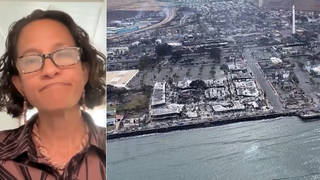
From Maui, we hear from a survivor of Hawaii’s historic wildfires, which have taken at least 55 lives to date. Vixay Phonxaylinkham, a resident of California, was on vacation with his wife and five children when they had to jump into the ocean to escape the raging fires and floated on a piece of wood for hours. “We stuck together. We held on. We’re not going to die this way. We’re here. We’re alive,” said Phonxaylinkham.
Transcript
AMY GOODMAN: We turn now to the Hawaiian island of Maui, where a devastating hurricane-fueled wildfire has killed at least 55 people. The catastrophic fire destroyed the historic town of Lahaina and left thousands of people homeless in what’s being described as the worst natural disaster in Hawaii’s history. On Thursday, President Biden issued a major disaster declaration for the state, freeing up federal funds. CNN reports the fire in Maui is now the second deadliest blaze in the United States in a century, trailing only the 2018 Camp Fire in California, which killed 85 people. And the death toll in Maui is expected to rise as search crews reach areas destroyed by the fast-moving fires. Hospitals are overwhelmed with burn patients. Power and cell service remains out for much of the area. Authorities say the fire destroyed all the buildings in the historic section of Lahaina, which once served as the capital of the Hawaiian Kingdom. Hawaii’s Governor Josh Green says it looks like a bomb went off in the town.
Later in the show, we’ll speak to two Native Hawaiian activists in Maui, but we begin with a horrifying account from a man from Fresno, California, named Vixay Phonxaylinkham, who survived the fire by racing into the ocean with his wife and five children. The family was visiting Lahaina for dinner when they got trapped by the fire.
VIXAY PHONXAYLINKHAM: And we tried to make our way back, but we couldn’t. We got stuck. We tried to come back. We ended up in Front Street, my family and I, and it was just black smoke coming above us. And traffic was stuck. We were there by the seawall, by Bubba Gump, I believe. And it got really real when we saw the flames. And I had to think fast. We had to get out. We left our vehicle. And myself and my wife and our five kids, we all got in the ocean.
We found a floating board that we hung onto. And we were out there floating. It was just so surreal. And everything was burning around, explosions, cars blowing up, like, embers just flying. Just, we couldn’t breathe, when the — we couldn’t breathe. There was no air. It was just the carbon monoxide. And we held on as best as we could, my wife and my kids. My older ones helped with the younger ones. And we tried to stick all together, the waves just trying to take us out to the ocean. We had to come back.
There were some locals that helped us, too, that were with us. They’re really great people. These people are amazing. And we were out for three hours, and we hung onto the seawall as best as we could, until we found a little cove area, where we were about for an hour with — two of the locals were with us and my family. And I found some sheet metal to cover them, because there was just still fire all around us, and the embers were flying out. We covered them and covered myself as best as I could.
At about 9:30 p.m., the fire came and rescued us. And we walked through the town, the little quarter they made. And everything was just burned down. Everything was destroyed. And yeah, we were at the shelter for that night.
The fight-or-flight instinct, survival, my adrenaline was rushing. It was just — I had to calm down. I worked in the ER for 15 years. It kind of helped. You’ve got to take a deep breath. You’ve got to do this. We did it. My kids were amazing. They were really good, to the point where my daughter, my little girl, was like, “Daddy, are you OK, Daddy?” My other ones wanted to — “We will be — we can go be OK.” They got us, and they’re really tired and exhausted and so forth. Just the ocean almost swept my kids away a few times. But yeah, we stuck together. We held on. And we’re not going to die this way, no. And we’re here. We’re alive.
AMY GOODMAN: That was Vixay Phonxaylinkham, who survived the fire in Maui by racing into the ocean with his wife and five children. When we come back, we’ll speak to two Native Hawaiian activists in Maui about the catastrophic fire. Stay with us.













Media Options